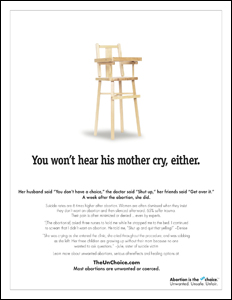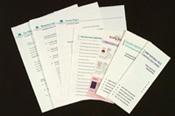|
Unwanted
Widespread coercion
Unsafe
Babies & moms at risk
Unfair
Injustice to all involved 
Hope & Healing
You are not alone
Coerced Abortions
Forced Abortions in U.S.
Rape & Incest
Teens & Abortion
Men & Abortion
Abortion & Suicide
Donate
Message Shop
Donate Library Books
Join our e-news list
Link to our site
About Us



| Suicide
and abortion 6 times higher among those who've had an abortion
for immediate
help
"The worst part of the pain is there's no one to share it with."
 “Parents are faced with a shell of a person ... and have no idea where they lost their child." "Three children are growing up without their mom ... because nobody wanted to ask questions.” "I don't know why the gun did not fire ... it's amazing how we can function so well in front of others, while suffering like that." You can read more of these stories below. But it's important to know that coercion is common and
unwanted abortions
are prevalent, yet seldom reported or shared. Chances are, there are teens, women and families in your own circles at risk of
or already hurt by unwanted abortions and post-abortion trauma. The pain suffered by so many women as a result of this trauma is often ignored, dismissed or discredited. Many struggle with depression, substance abuse, anxiety disorders, trauma symptoms and thoughts of suicide. Suicide is 6 times higher among women with a history of abortion compared to women who gave birth.1
(See also
Psychological Effects page, including fact sheets.) This is an urgent, yet sensitive issue. Please learn more and help in any way you can. 
They need to know we care ... that help, hope & healing are possible |
Thoughts from women who've been there ... |
"[My sister] was crying when she entered the clinic, she cried throughout the procedure, and was sobbing as she left. But no one at the clinic asked her any questions. ...
"One week after the abortion, she took her life with a gunshot striking her heart. Three children are growing up without their mom because nobody wanted to ask questions." –Julie "I truly felt like the abortionist had ripped out my heart and my soul. It was a pain so heavy, on more than one occasion I found myself contemplating suicide. I overdosed on pills more than once. ..." –Geraldine "My husband told me, "Either you have an abortion, or I'll leave you." –Sandra
"Nobody else in my life had tried to help me ... they would just look down their noses at me for being pregnant." –Cathie "I needed to be self-destructive so this baby would know that I didn't do it on purpose and I would show it how life was without it. Horrible." –Laura “With quiet deliberation, I took my handgun from under my pillow. I chambered a round, walked into my living room, sat in a chair, put the gun to my head and pulled the trigger. To this day, I cannot think why the gun did not fire … I find it amazing in retrospect, how we can function so well in front of others, while suffering like that.” –Janet “A few days afterwards, I began to feel relief. I wasn’t pregnant anymore. I felt pretty good. But I did not escape the aftermath of abortion.
I had nightmares and recurring dreams about my baby. I couldn’t work my job. I just laid in my bed and cried. Once, I wept so hard I sprained my ribs. Another time while crying, I was unable to breathe and I passed out.” –Karen in
Aborted Women, Silent No More “I cracked up my car three times, driving recklessly at extreme speeds. My life became a series of self-destructive calamities.” –Francine in
Forbidden Grief “My sister has since had two stillbirths–as a family we have grieved and empathized with her and her husband’s dreadful pain. … When my mom says no one in the family has experienced pain like my sister my heart cries out silently: I have. –Katarina in
Giving Sorrow Words | 

6 times higher suicide rate
Two national records-based studies from Finland revealed that aborting women were six-seven times more likely to commit suicide in the following year than were delivering women.1
Up to 60% have suicidal thoughts
In a survey in a major scientific journal, 36% had thoughts of suicide after abortion.2 In another survey, approximately 60% of women with post-abortion problems reported suicidal thoughts, with 28% attempting suicide and half of those attempting suicide at least twice.3
154% higher risk of suicide
A study of more than 173,000 American women who had been pregnant found that, during the eight years after pregnancy, women who aborted had a 154% higher risk of suicide than those who gave birth.4
Higher suicide risks for teens
Teen girls are 6 times more likely to attempt suicide if they have had an abortion in the last six months than girls who have not had an abortion, and 2-4 times more likely to commit suicide after abortion compared to adult women.5 Hope and healing
The journey is not easy, but there are people who understand ... who share your pain ... who will walk with you toward new healing, restoration and peace. >> learn more |
“The worst part of the pain is there’s no one to share it with, I wouldn’t tell anyone and my husband, being a typical man, just shuts down and gets on with things — doesn’t know why I’m ‘still going on about it.' ... Not a day goes by when I don’t think about it. ... I wish I could change everything and go back … “ –Anonymous mother of 4, in
Giving Sorrow Words “I am now appalled at how ignorant I was about fetal development. My doctor said the baby—at six-and-a-half weeks—was ‘just a blob,’ and I believed him. Afterwards, before I even got home, I began to cry. It didn't help. When finally I stopped crying on the outside, I kept crying on the inside. … I felt cheated, betrayed, and manipulated. I went to counseling and the psychologist said ‘Forgive yourself,’ and ‘Let yourself go on.’ She didn't say how.” –- Judith,
in Hope &
Healing Newspaper Insert
"It's amazing how we can function so well in front of others, while suffering like that."
–- Anonymous, survivor of post-abortion suicide attempt
Teens are at risk of coercion and post-abortion depression and suicide |
Teenage girls are six times more likely to attempt suicide compared to teens who did not have an abortion.5
"Teens are suffering adult-sized pain with a child's coping skills."
| Teens pressured, manipulated by authorities and others School counselors, social workers and others in authority can exert tremendous influence over a vulnerable teenager, steering her into an unwanted abortion ... leaving her alone to deal with its aftermath. There are few safeguards currently in place to protect teens from coerced abortions. In states where parental consent is needed for an abortion, the judicial bypass system is seriously flawed. Without cross-examination of witnesses and the introduction of witnesses who would testify that the abortion is not in the girl’s best interests, how can judges make an informed decision? We can't be sure that the adults seeking permission for her to abort without notifying her parents are not themselves manipulating or pressuring the girl to abort? Even in states that require parental consent, it is all too easy for those pushing abortion to simply transport the girl across the state line. The Child Custody Protection Act would make it a federal crime for anyone to take a girl out of state for an abortion in order to avoid involve-ment in the situation by the girl’s parents. Even this will only protect a few teens, however. In many cases, it is the parents who are pressuring or coercing their daughters into abortion. The only way to protect these teens is to pass laws that will make abortionists liable for failing to protect women, especially teens, from coerced abortions." – Dr. David Reardon, Director, Elliot Institute | "Parents are faced with a shell of a person and have no idea where they lost their child. ... "How easy it is to chalk it up to moody adolescence when the reality is that teens are suffering adult-sized pain with a child's coping skills. The only outside source of help they may know — Planned Parenthood — tells them to 'get over it.' "My dream is to get this pain out in the open. I want to help give women the freedom to acknowledge that abortion hurts." –Anonymous parent
and survivor of abortion "Every Tuesday, a bus picked up students and took them to the Planned Parenthood clinic.
"School counselors arranged the visits. It was all so organized … Still today, I feel like I did not decide to have the abortion … I was only 14 … "The nurse said this was not the time to be asking questions, that I should have asked them sooner." –Gaylene, survivor of
two post-abortion suicide attempts >> learn more about
abortion and teens |
The injustice of unwanted or deceptively informed abortions and their aftermath |
The synergy of coercion > 64% felt pressured by others to abort.2 > 84% said they did not receive adequate counseling.2 > 52% felt rushed; 54% uncertain, yet 67% received no counseling.2 > 79% were not told of available alternatives.2 > Personal and expert pressure often comes from all sides.12 > Coercion can escalate to violence.12 > Homicide is the leading killer of pregnant women.13 Trauma and the psychological impact > 65% higher risk of clinical depression compared to women who give birth.6 > A higher risk of depression after abortion even when the pregnancy was unplanned.7 > 65% reported symptoms of post-traumatic stress disorder, which they attributed to their abortions.2 > In the same study, slightly over 14% reported all the symptoms necessary for a clinical diagnosis of abortion-induced PTSD.2 > 60% said they felt “part of me died.”2 > Women who had abortions were more than twice as likely as delivering women to be >subsequently hospitalized for psychiatric illness within six months.8 > Women who have abortions subsequently require significantly more treatments for psychiatric illness through outpatient care.9 > Eight weeks after abortion, 44% reported nervous disorders, 36% experienced sleep disturbances, 31% had regrets about their decision, and 11% had been prescribed psychotropic medicine by their family doctor.10 > Aborting women were 30% more likely than delivering women to report symptoms of generalized anxiety disorder, even when the pregnancy was unplanned.11 Learn more
Psychological Risks Fact Sheet
Teens at Risk
Men, Abortion and
Suicide
The
Abortion Suicide Connection by David Reardon, PhD (off-site link)
Higher Death Rates Found After Abortion (off-site link) See citations for this page need help? we care
 |